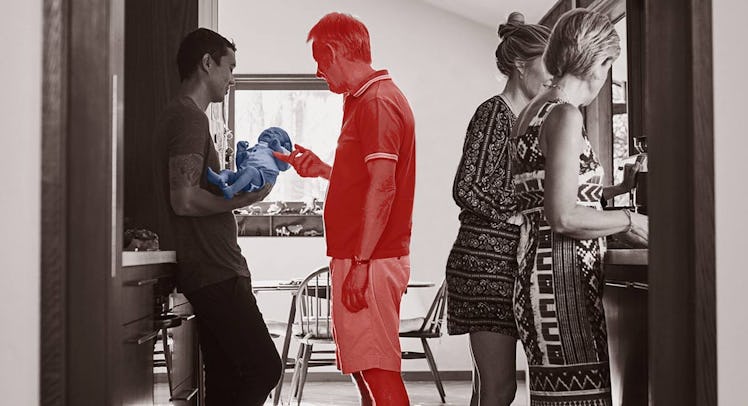How to Pass Around a Baby Without Shredding Its Immune System
Parents should engage in extreme caution and some awkward questions to keep their baby safe from filthy hands.

People have a tendency to get handsy with infants because they (the infants) are undeniably squeezable. But human beings are filthy creatures that live in a filthy world and they have filthy hands that can lead to filthy babies. This is why it’s not the best idea to let people get their grubby mitts all over a kid still getting their immune system cooking. This is also how awkward situations are born. (“Can I hold her?” “No, you’re a gross person.”) Happily, there is a middle path of hand sanitizers and conscientious cuddles that allow inlaws and pals to get hands on the new kid while protecting the baby from disease.
“There is no hard and fast rule on when you can start introducing visitors to your newborn, nor is there a hard and fast rule on when you can take your newborn out into public,” explains pediatrician Dr. Jarret Connor. But that doesn’t mean there aren’t best practices, starting with simple caution. But even the most cautious parents who refuse to take their new baby into the snorting, coughing masses will still face the onslaught of lookie-loos at the doorstep.
Preventing those visitors from spreading a disease to a new kid can be accomplished well before they even come through the door. “It can start with just a frank open and honest conversation,” Connor says. That means making sure that visitors understand that an infant has a fragile immune system. To that end, parents are well within bounds to ask any potential visitors if they’ve been around any sick people recently.
“If someone is coming over to visit who has a sick child at home, even though the parent might not be exhibiting symptoms, they could potentially carry that virus or illness to the baby,” Connor warns.
But because some people may misremember or simply not know if they’re carrying something nasty, parents should put in place a couple of baby-meeting ground rules. The first is to make sure people wash their hands or slather on some hand sanitizer right in the door. Second, limit baby kissing to only the closest relatives and keep them limited. Finally establish rules regarding where the kid can be prodded and tickled, the safest of which are the feet, the chest and, happily, the belly.
“Touching should be ideally limited to areas away from their face, or even hands,” Connor says. “Babies like to get their hand in their mouth.”
And while all of the prevention is a fine start, it’s important for parents to know that there are active ways to protect and boost their infant’s immunity so that they don’t fall prey to any beasties coming into the home. Breastfeeding, for instance, helps a new kid acquire some immunity from their mother. Also, making sure that older siblings and adults who come in regular contact with the kid are vaccinated can create an additional layer of protection.
But Connor points out that the kid doesn’t have to stay on lockdown forever. In a matter of months, their immune system will start working well enough it will be able to hold its own against the germ-ridden confines of a daycare or early learning center.
“After about the age of six months old, the immunity starts to kick in,” Conner assures. “They will have frequent colds and diarrheal illness, but it does help build their immunity.”
So, yeah, there’s that.